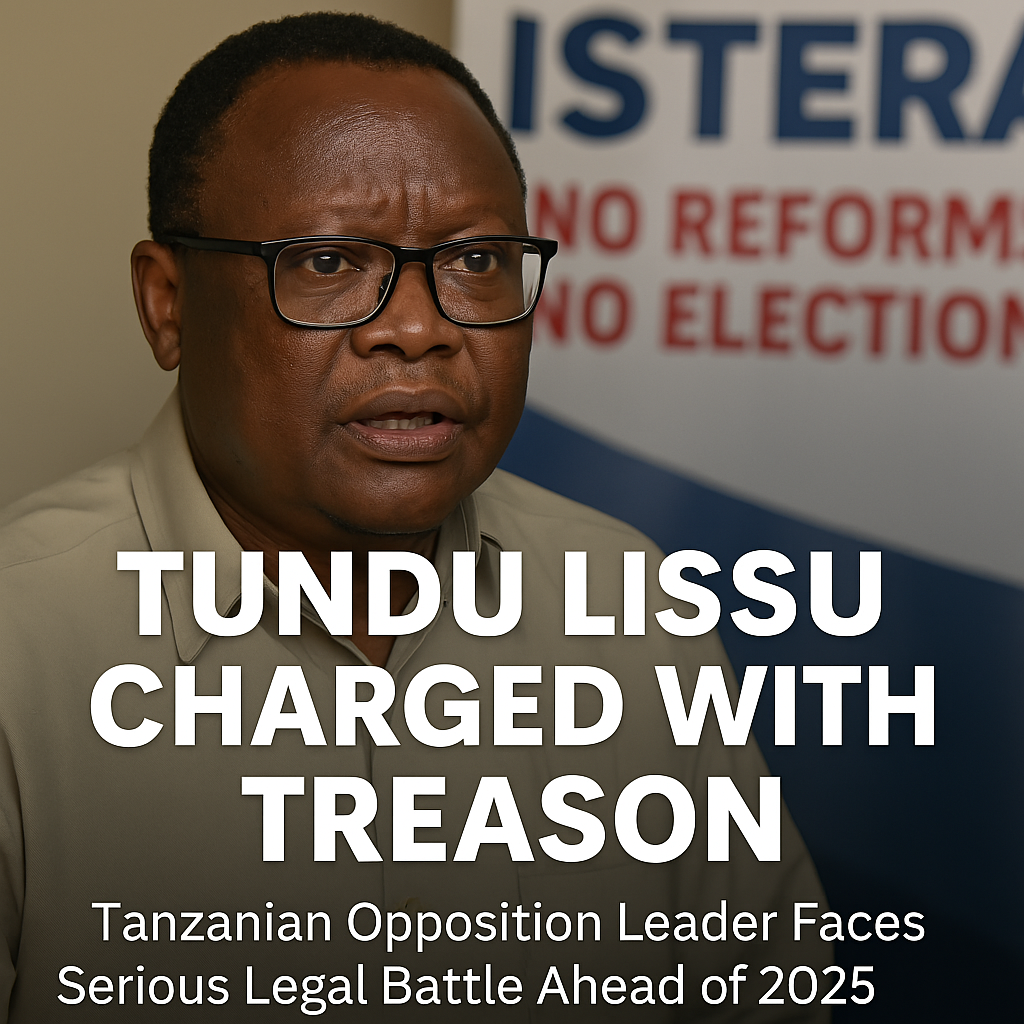
simply amazing, always for you.
Tundu Lissu, the prominent Tanzanian opposition leader and chairman of the CHADEMA party, has been charged with treason following his arrest after a political rally in the southern Mbinga district. The arrest and subsequent charges are directly linked to his vocal campaign for electoral reforms ahead of the nation’s general elections scheduled for October 2025.

Background to the Charge: “No Reforms, No Election” Campaign
Lissu, who has been a key figure in Tanzania’s opposition politics for years, has been pushing for fundamental changes in the country’s electoral system. His “No Reforms, No Election” campaign is aimed at ensuring that Tanzania’s elections are free, fair, and credible. This has led to mounting tensions with the ruling government under President Samia Suluhu Hassan, who assumed power in 2021 after the death of her predecessor, John Magufuli.
Lissu’s recent rally in Mbinga, where he addressed supporters, was marked by a call for widespread electoral reforms. The government, however, viewed his speech as a direct incitement to rebellion, leading to his arrest and the subsequent treason charge. The Tanzanian government has accused him of attempting to disrupt the upcoming elections and undermine the country’s stability.
The Legal Implications of the Treason Charge
The charge of treason is a serious legal matter in Tanzania, carrying severe penalties that could include a death sentence upon conviction. On April 10, 2025, Lissu was presented in court, where he was denied the opportunity to enter a plea. His legal team, led by prominent lawyer Rugemeleza Nshala, has strongly argued that the charges against Lissu are politically motivated and meant to silence dissent ahead of the elections.
Lissu also faces an additional charge of publishing false information related to his campaign and remarks, with his next court appearance scheduled for April 24, 2025. Human rights organizations and political analysts have expressed concern that these charges are part of a broader crackdown on opposition voices in Tanzania.
Political Climate and International Concerns
Since President Samia Suluhu Hassan’s rise to power, the political climate in Tanzania has been a subject of intense scrutiny. Initially, Suluhu was hailed for reversing some of the more authoritarian policies of her predecessor, Magufuli. However, her government has faced criticism in recent years for targeting opposition leaders, activists, and journalists critical of her administration.

Lissu, who survived an assassination attempt in 2017, remains a key figure in Tanzania’s political landscape. His survival of the assassination, in which he was shot 16 times, only added to his stature as a symbol of resistance against political repression. Despite the personal risks, Lissu has continued to challenge the government’s policies, calling for reforms that could better reflect the will of the people.
Human Rights and Electoral Integrity Concerns
The arrest of Lissu and his subsequent legal troubles are fueling broader concerns about the state of democracy and human rights in Tanzania. Critics argue that the government is stifling political dissent, using the legal system to target opposition leaders ahead of the elections. The international community, including human rights organizations, has raised alarm over the growing repression and the potential for the elections to be marred by unfair practices.
The CHADEMA party has vowed to continue its push for reforms and has even threatened to boycott the upcoming elections unless significant changes are made to ensure a fair electoral process. This stance has sparked a larger conversation about the integrity of Tanzania’s electoral system and the future of its democratic institutions.
What’s Next for Tanzania’s Opposition and the 2025 Elections?
As the legal process unfolds, the spotlight will remain on Tanzania’s upcoming general elections in October. Tundu Lissu’s challenge to President Suluhu’s administration is shaping up to be one of the most high-stakes political contests in the country’s recent history. With his call for electoral reforms resonating with many Tanzanians disillusioned with the current system, Lissu’s legal troubles could serve to galvanize his supporters and further fuel the campaign for electoral change.
As the country approaches the polls, the growing tensions between the opposition and the ruling party will likely dominate the political discourse, with the eyes of the international community focused on the fairness of the electoral process and the fate of political dissent in Tanzania.
Conclusion: A Critical Moment for Tanzanian Politics
Tundu Lissu’s arrest and the treason charges against him represent a critical moment in Tanzanian politics. The charges underscore the challenges facing opposition leaders in the country and the increasing risks associated with speaking out against the government. As the nation prepares for the 2025 elections, the stakes have never been higher for both the government and the opposition, and the world will be watching closely to see how this political drama unfolds.
For more updates on Tanzania’s political climate and the 2025 elections, stay tuned to our news platform.
